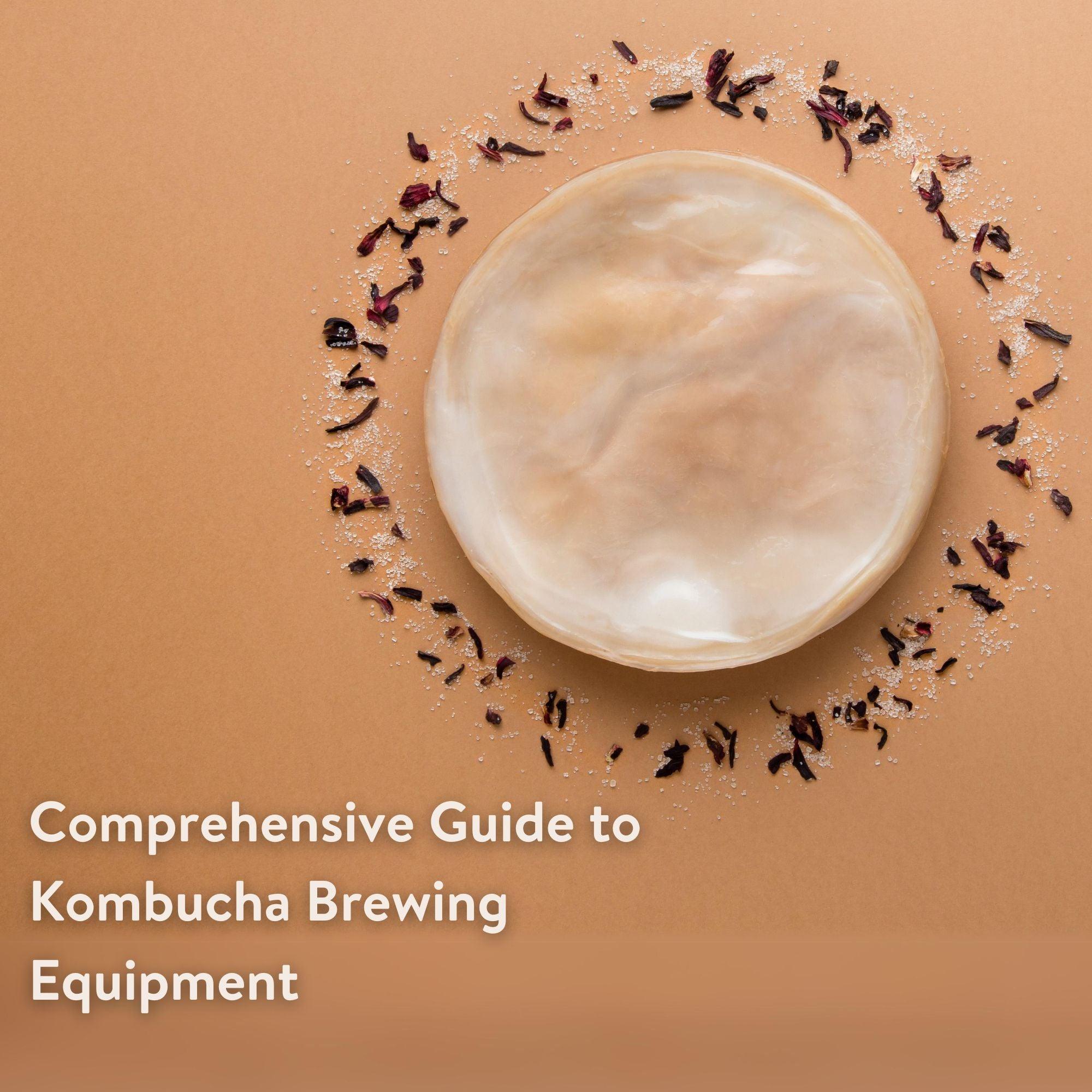Discover the Health Benefits of Kombucha - The Ultimate Guide
Welcome to our ultimate guide to kombucha and its potential health benefits! Kombucha has become a popular beverage for its unique taste and potential health advantages. In this article, we will explore various aspects of kombucha, including its fermentation process, probiotic content, impact on gut health, immunity, mental health, and skin, among others. By the end of this guide, you will have a comprehensive understanding of the numerous reasons to add kombucha to your diet. Let's dive in!
What is Kombucha?
Kombucha is a type of fermented tea that has exploded in popularity over the past few years due to its many health benefits. It is made by combining sweetened tea with a symbiotic culture of bacteria and yeast, commonly referred to as a SCOBY. The SCOBY feeds on the sugar in the tea, producing a sour and slightly effervescent beverage that is packed with probiotics and other nutrients.
Originating in China over 2,000 years ago, kombucha has since been adopted by many cultures around the world, including India and Russia. The tea is typically made with black or green tea, but can also be brewed using herbal teas or a combination of teas.
The Fermentation Process of Kombucha
Kombucha's unique taste and effervescence come from its fermentation process. The process begins when a SCOBY, a symbiotic culture of bacteria and yeast, is added to sweetened tea. The SCOBY feeds on the sugar in the tea and releases healthy organic acids, probiotics, and enzymes.
| Fermentation Variables | Description |
|---|---|
| Temperature | The ideal temperature range for the fermentation process is between 68 to 85°F. |
| Duration | Fermenting kombucha typically takes between 7 to 30 days, depending on the desired taste. |
| Airflow | Kombucha requires oxygen to ferment. The SCOBY should be allowed to breathe and should not be completely covered. |
The duration of the fermentation process is crucial in determining the taste and carbonation levels of the kombucha. After fermentation, the tea is bottled and left to carbonate further. This allows natural carbon dioxide to build up, creating the desired fizzy effect.
Conclusion:
The fermentation process is what gives kombucha its unique taste and makes it a beneficial drink. Factors such as temperature, duration, and airflow play important roles in determining the taste and carbonation levels of the final product.
Probiotics in Kombucha
Kombucha is an excellent source of probiotics, which are live microorganisms that offer numerous health benefits when consumed. In kombucha, the probiotics are created during the fermentation process, where live bacteria and yeast convert the tea's sugars into organic acids, enzymes, and probiotics.
Probiotics in kombucha support the growth of beneficial bacteria in the gut, promoting gut health. The probiotic strains typically found in kombucha include Lactobacillus, Bifidobacterium, and Streptococcus, which help in digestion, improve immunity, reduce inflammation, and promote overall well-being.
Probiotic Strains in Kombucha
| Probiotic Strain | Benefits |
|---|---|
| Lactobacillus | Improves digestion, reduces inflammation, balances gut microbiota, and supports immunity |
| Bifidobacterium | Supports digestion, improves immune function, and reduces inflammation |
| Streptococcus | Helps in digestion and boosts immunity |
Research shows that the probiotics in kombucha can help balance the gut microbiome, reducing the risk of digestive disorders. Additionally, the probiotics may help reduce anxiety and depression by improving gut health, which is connected to mental well-being.
Impact of Kombucha on Gut Health

Kombucha has been touted for its potential to help maintain a healthy gut. This may be due to the combination of probiotics and organic acids found in the drink.
Studies have suggested that probiotics can promote the growth of beneficial bacteria in the gut, improving digestion and reducing inflammation. Kombucha specifically may have a positive impact on conditions such as irritable bowel syndrome (IBS) and Crohn's disease.
One study published in the Journal of Medicinal Food found that kombucha helped prevent and heal stomach ulcers in rats, potentially due to its high levels of antioxidants and ability to reduce acid secretion in the stomach.
It's important to note that more research is needed to definitively establish the relationship between kombucha and gut health. However, including it as part of a balanced diet may have potential benefits for digestive health.
Kombucha and Mental Health
Kombucha's benefits extend beyond physical health, with potential positive effects on mental well-being.
The probiotics found in kombucha may help improve gut health, which has been linked to better cognitive function and mood regulation.
Studies have shown that individuals consuming probiotics may experience reduced symptoms of anxiety and depression. This correlation between probiotics and mental health may be due to the "gut-brain axis," which involves the communication between the gut microbiome and the central nervous system.
In addition to its probiotic content, kombucha contains antioxidants that can support cognitive health and reduce oxidative stress in the brain.
"Fermented foods like kombucha can boost brain health in several ways, including reducing inflammation and lowering stress levels. The probiotics and antioxidants present in kombucha may also offer neuroprotective benefits." - Dr. Josh Axe, DNM, DC, CNS
Further research is needed to better understand the exact mechanisms through which kombucha may impact mental health. However, the potential benefits of including probiotics and antioxidants in one's diet may be worth considering for those looking to support both their physical and mental well-being.
Kombucha and Mental Health
The connection between the gut and mental health has been gaining recognition in recent years. The gut-brain axis, which refers to the bidirectional communication between the gut and the nervous system, has been shown to play a crucial role in regulating mood, behavior, and cognitive function.
Kombucha, with its probiotics and organic acids, may offer support for mental health by positively influencing the gut microbiome. By promoting a healthy balance of gut bacteria, kombucha may help regulate the production of neurotransmitters like serotonin and dopamine, which are involved in regulating mood and emotions.
A study published in the journal Annals of General Psychiatry found that probiotics may have a role in reducing symptoms of depression and anxiety.
"Probiotics supplementation showed promise as an adjuvant treatment for major depressive disorder and anxiety disorder."
While more research is needed to confirm these findings, incorporating kombucha into a well-rounded diet may offer potential benefits for mental health.
Kombucha and Skin Health
Kombucha has been found to contribute to healthy skin, thanks to its antioxidant and organic acid content. Antioxidants help protect the skin from toxins and free radicals, while organic acids may help reduce inflammation and combat the signs of aging.
One study found that kombucha extract applied topically to the skin helped improve skin elasticity and reduce the appearance of wrinkles and fine lines. Another study found that kombucha can help reduce oxidative stress in the skin, which can lead to improved skin health.
In addition to its potential benefits for skin health, kombucha may also help improve hair health. The probiotics and other nutrients found in kombucha can support healthy hair growth and reduce inflammation in the scalp.
Addressing Digestive Issues with Kombucha
If you suffer from digestive issues, you may be interested in incorporating kombucha into your diet. Kombucha's probiotics and organic acids may help improve digestion and reduce inflammation in the digestive tract.
Research has shown that consuming probiotics, like those found in kombucha, can reduce symptoms of bloating, gas, and acidity in individuals with digestive disorders, such as irritable bowel syndrome (IBS) and Crohn's disease.
| Kombucha and Digestive Health | Reference |
|---|---|
| A study found that probiotics can improve symptoms of IBS, including bloating and gas | World Journal of Gastroenterology |
| Kombucha's organic acids may protect against harmful bacteria in the gut and reduce inflammation in the digestive tract | Molecules |
While kombucha may be helpful for some individuals with digestive issues, it is important to note that it may not be suitable for everyone. If you have a history of digestive issues or concerns, it is recommended to consult with a healthcare professional before adding kombucha to your diet.
Kombucha in India and Its Cultural Significance
Kombucha, a fermented tea beverage, has become increasingly popular across India in recent years. Although traditionally associated with countries like China and Russia, kombucha has quickly found its place in the Indian market, with several locally produced brands also emerging.
The popularity of kombucha in India can be attributed to its numerous health benefits, which have been widely recognized and promoted by health enthusiasts and celebrities alike. Kombucha's probiotics, antioxidants, and organic acids are believed to aid digestion, boost immunity, improve skin health, and promote overall well-being.
Moreover, kombucha's sour and tangy flavor has also found favor among younger consumers, who enjoy experimenting with unique and unconventional beverages.
India's rich culinary history, which includes a wide variety of fermented foods and beverages, has also contributed to kombucha's cultural significance in the country. The art of fermentation has been a part of Indian cooking for centuries, with foods like idli, dosa, and pickles using similar fermentation techniques as kombucha.
Some Indian brands have even incorporated local ingredients and flavors into their kombucha products, adding a unique touch to the traditional beverage. For instance, turmeric, ginger, and tulsi (holy basil) are some of the commonly used ingredients in Indian kombucha brands, adding an Indian twist to the drink.
As the kombucha trend continues to grow in India, it is evident that the beverage has become more than just a drink - it has become a part of the country's evolving food culture.
Common Concerns and Allergies Related to Kombucha
Kombucha, like any food or beverage, may cause adverse reactions in some individuals. Common concerns and allergies related to kombucha include:
- Allergic reactions: Some people may experience allergic reactions to certain ingredients or the fermentation process. Symptoms may include hives, swelling, and difficulty breathing. If you experience any of these symptoms after consuming kombucha, seek medical attention immediately.
- Bloating: Kombucha's carbonation and probiotic content can lead to bloating in some individuals, especially those with pre-existing digestive issues.
- Gas: Similar to bloating, kombucha's fermentation process can create gas in the digestive tract, resulting in discomfort or flatulence.
- Acidity: Kombucha has a slightly acidic pH, which can exacerbate symptoms in individuals with acid reflux or other gastrointestinal conditions.
If you're concerned about any potential side effects, it's best to consult with a healthcare professional before adding kombucha to your diet. If you do decide to try kombucha, start with small amounts and monitor your body's response.
Frequently Asked Questions about Kombucha
Q: Is kombucha safe during pregnancy?
A: While there is usually no harm in consuming kombucha during pregnancy, it is recommended to consult with a healthcare provider before consuming it. Pregnant women should also be cautious about the alcohol content in kombucha and ensure it does not exceed 0.5%.
Q: Can children consume kombucha?
A: It is generally safe for children to consume kombucha in moderation. However, it is recommended to dilute it with water to reduce their intake of caffeine and sugar. Children with weakened immune systems or digestive disorders should avoid consuming kombucha.
Q: Can kombucha cure illnesses?
A: Kombucha is not a cure for illnesses, but it may have health benefits. It is important to consult with a healthcare professional for any medical concerns and not to rely on kombucha as a treatment.
Q: How much kombucha should I drink daily?
A: The recommended daily intake of kombucha varies, but it is generally safe to consume 4-8 ounces per day. It is also important to gradually introduce kombucha into your diet and to pay attention to any adverse reactions.
Q: Can I make kombucha at home?
A: Yes, it is possible to make kombucha at home, but it is important to follow proper instructions and hygiene practices to prevent any contamination. It is also recommended to use a pH strip to ensure the acidity levels are safe for consumption.
Conclusion
Kombucha is a unique and flavorful beverage with several potential health benefits. From supporting gut health and immunity to promoting healthy skin and mental well-being, the probiotics, organic acids, and antioxidants found in kombucha have been studied for their numerous advantageous effects.
As with any dietary addition, it is important to consider any potential allergies or adverse reactions to kombucha. However, when consumed in moderation and in accordance with individual needs, kombucha can be a valuable addition to a balanced and healthy lifestyle.
So why not give it a try? Add a bottle of kombucha to your grocery list or try your hand at brewing your own. You may just discover a new favorite beverage that supports your overall well-being.
Stay healthy, hydrated, and happy!



